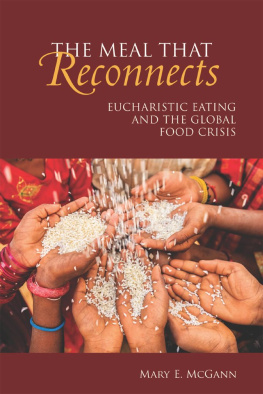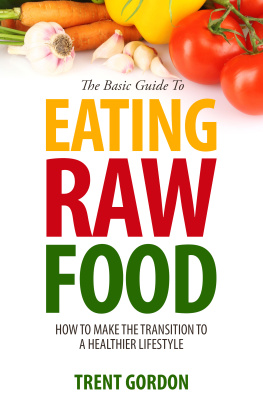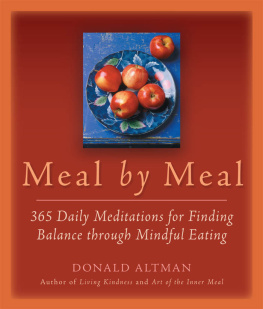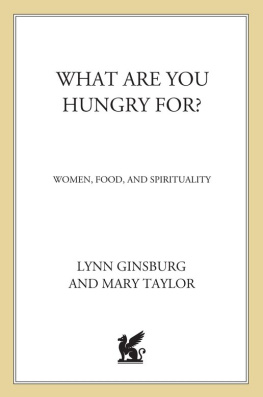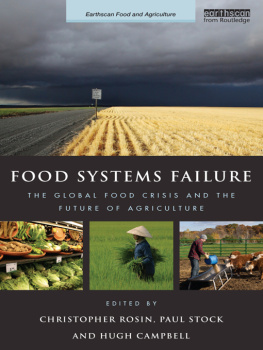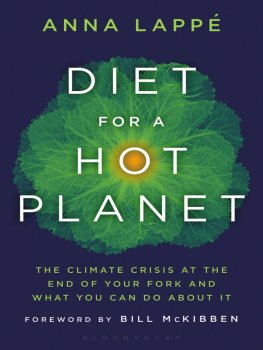McGann provides us with a wonderful example of how sacramental theology and our liturgical celebrations can deepen our commitment to our planet and to true justice for the dispossessed and the hungry. Along the way she has given us a very accessible account of the complex global food crisis that we face.
John F. Baldovin, SJ
Professor of Historical and Liturgical Theology
Boston College School of Theology & Ministry
Mary McGanns tour de force brings together two substantial topics. An inspirational and pastoral handbook of places to start based on the reality of engaging with a meal that reconnects all of this through the simplicity of real bread, real wine, real community, real meals, real conversations, and the real and imminent crises in the world for which we have been called to care in response to the cry of the earth and the cry of the poor.
Lizette Larson-Miller, author of Sacramentality Renewed: Contemporary Conversations in Sacramental Theology
Rarely does one find a work that so clearly integrates the ancient symbols of Christian faith with contemporary scientific assessment of the fundamental need for food and drink. In The Meal That Reconnects, Mary McGann offers a well-documented and articulate presentation of the relationship between the meals of Jesus as expressions of Gods reign of justice and peace and how this life-giving practice is thwarted and deformed by industrialization of food systems in which we all participate.
Fr. Samuel Torvend
Professor of Religion
Pacific Lutheran University in Tacoma, Washington
While forthrightly exposing the global food economys degradation of bodies and environments, this book offers an account of food justice that never abandons the sumptuous flavors and joys of the meal itself. This is a food-forward spirituality of the Eucharist to savor and share in an ecological age.
Benjamin Stewart, PhD
Gordon A. Braatz Associate Professor of Worship
Lutheran School of Theology at Chicago
Today we face a crisis regarding food and know that we need to change our ways of food production and consumption if we, and the planet, are to survive. Likewise, as Christians, we are in a crisis in our understanding of the Eucharist. Eucharist is an activity. An activity that supposes an awareness of our dependence... this book helps us develop that awareness.
Thomas OLoughlin, author of Eating Together, Becoming One
Mary McGann invites readers into a eucharistic vision of justice, care, and reverence: food as an interspecies paschal event knitting together all that is. Critical and profoundly connective, this book is a passionate invitation to eating well and wisely, reverently and thankfully, ethically and joyfully on our good Earth.
Lisa E. Dahill, PhD
Professor of Religion
California Lutheran University
McGann plumbs essential sources from ecology, food studies, agriculture, economics, health and wellness, social ethics, liturgical studies, and theologyand then in very accessible terms, shows the hope-filled potential of the Christian Eucharist as a paradigm to counter the vast injustices of the current global corporate food industry. A must read!
Dawn M. Nothwehr, OSF, PhD
The Erica and Harry John Family Professor of Catholic
Theological Ethics Catholic Theological Union
Cover design by Ann Blattner. Photo courtesy of Getty Images.
Scripture quotations are from New Revised Standard Version Bible 1989 National Council of the Churches of Christ in the United States of America. Used by permission. All rights reserved worldwide.
Excerpts from the English translation of The Roman Missal 2010, Inter national Commission on English in the Liturgy Corporation. All rights reserved.
Excerpts from documents of the Second Vatican Council are from Vatican Council II: The Conciliar and Postconciliar Documents, edited by Austin Flannery, OP, 1996. Used with permission of Liturgical Press, Collegeville, Minnesota.
2020 by Order of Saint Benedict, Collegeville, Minnesota. All rights reserved. No part of this book may be used or reproduced in any manner whatsoever, except brief quotations in reviews, without written permission of Liturgical Press, Saint Johns Abbey, PO Box 7500, Collegeville, MN 56321-7500. Printed in the United States of America.
Library of Congress Cataloging-in-Publication Data
Names: McGann, Mary E., author.
Title: The meal that reconnects : Eucharistic eating and the global food crisis / Mary E. McGann, RSCJ.
Description: Collegeville : Liturgical Press Academic, 2020. | Includes bibliographical references and index. | Summary: Discusses the sacredness of eating, the planetary interdependence that the sharing of food entails, and the destructiveness of the industrial food system, presenting the food crisis as a spiritual crisis. The author invites communities to reclaim the foundational meal character of eucharistic celebration while offering pertinent strategies for this renewalProvided by publisher.
Identifiers: LCCN 2019032400 (print) | LCCN 2019032401 (ebook) | ISBN 9780814660317 (paperback) | ISBN 9780814660324 (epub) | ISBN 9780814660324 (mobi) | ISBN 9780814660324 (pdf)
Subjects: LCSH: Dinners and diningReligious aspectsCatholic Church. | Lords SupperCatholic Church. | HungerReligious aspectsCatholic Church. | Food supplyMoral and ethical aspects. | Food supplyReligious aspectsCatholic Church.
Classification: LCC BR115.N87 M378 2020 (print) | LCC BR115.N87 (ebook) | DDC 234/.163dc23
LC record available at https://lccn.loc.gov/2019032400
LC ebook record available at https://lccn.loc.gov/2019032401
For all the hungry people in the world, especially the women and children
Contents
Preface
Eating is a foundational human act, one that ties us to all other living and nonliving creatures and to the complex processes of exchange that characterize the planetary community. Meeting more than the biological need to survive, eating affords a sense of pleasure, an experience of nurture, and an invitation to celebrate the goodness of life, the faithfulness of Mother Earth, and the graciousness of a God whose creative life flows through the web of creaturely existence.
But today food is in crisis and with it the Earth and her peoples. Food production at the hands of a corporate, multinational food industry is exacerbating hunger, poverty, and inequality; creating ill health; contributing to climate change; destroying ecosystems; and poisoning Earths resources. More profoundly, the market forces driving this system have estranged human beings from the sources and processes by which food comes to our tables. They insulate us from the devastating effects of industrial food production. Food has become a product to be consumed rather than a living relationship between the Earth and the human community. To eat in ignorance of this is to live a distortion of our foundational relationship with the world and ultimately with God who created Earth and became incarnate in the biological web of earthly being.
Given the financial and political power of corporate agribusiness, this transition will come about only from the ground up, through human choices, increased awareness, and renewed commitments to health, sustainability, justice, and human happiness. It is my contention that the spiritual resources of the many faith traditions that cherish rituals of eating, sharing food, and blessing Godmost especially Christian Eucharistare critical to this process.
This volume asks: How can eucharistic eating create an alternative paradigm and effect a prophetic healing of relationships with the Earths abundance and all who share it? How can eucharistic practice strengthen relationships of justice, solidarity, and reciprocity between human communities and the rest of the web of life?

